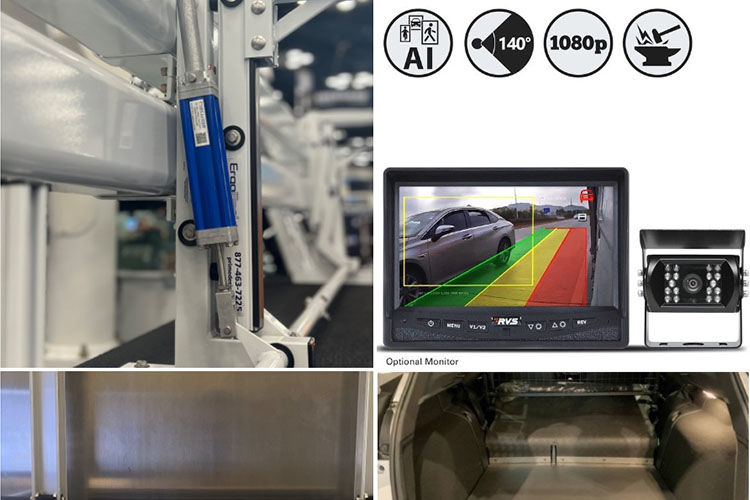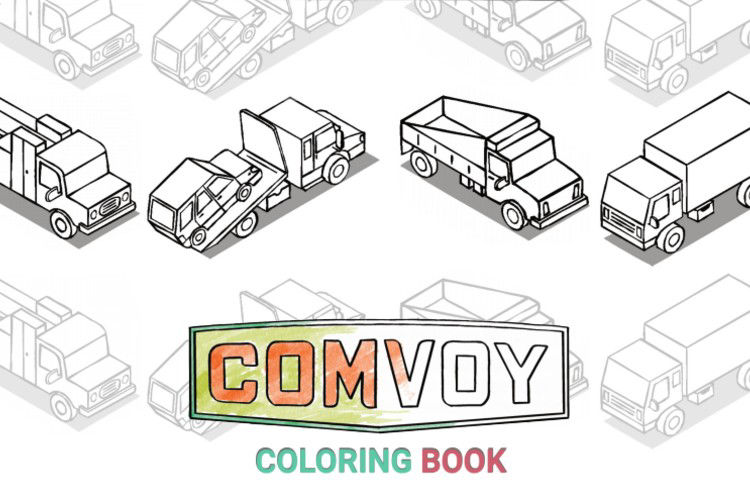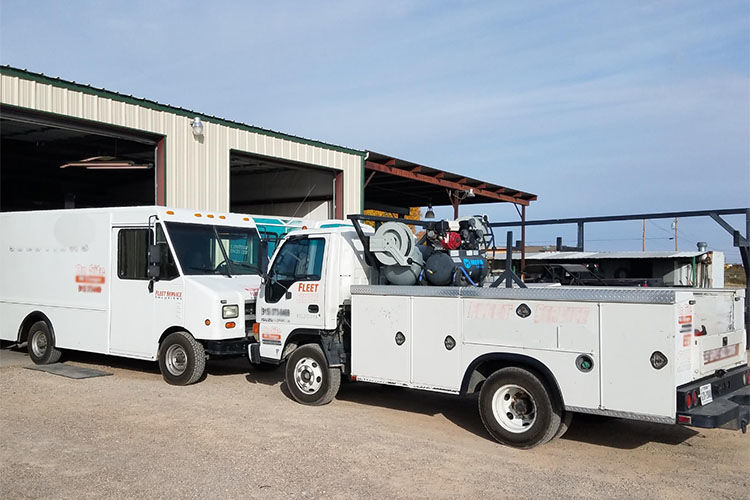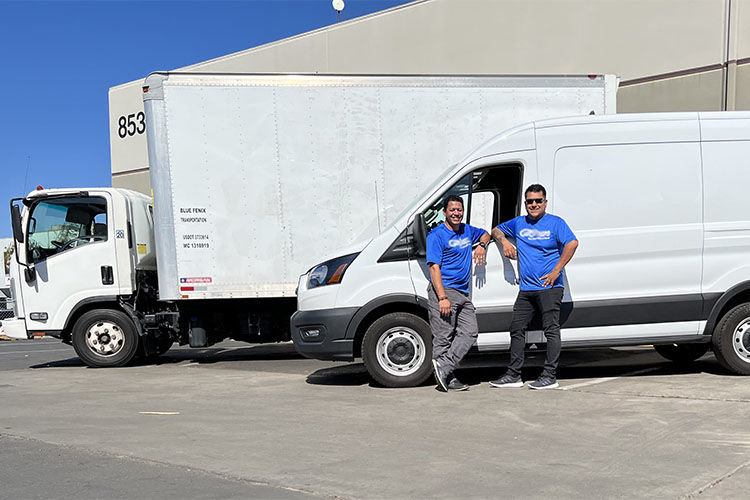How to Start a Food Truck Business
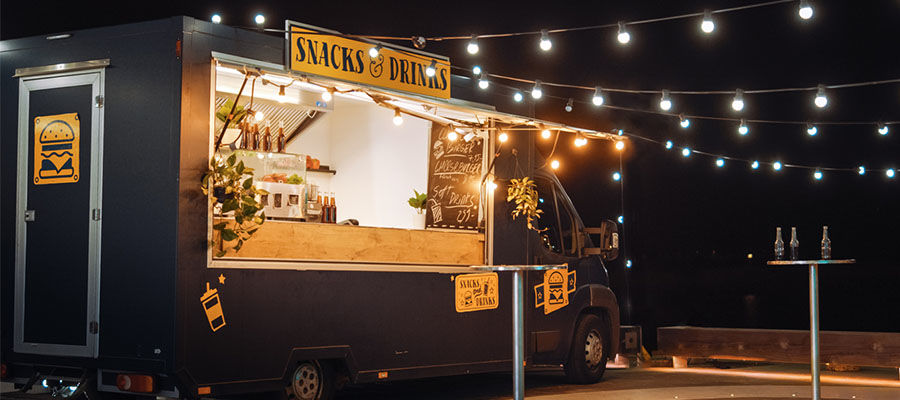

How to Start a Food Truck Business
Starting a food truck business can be a great way to get into the restaurant business or expand your current restaurant without investing in a lot of property or equipment.
Food trucks built upon vans like this are also a great way to test your concept before investing in a brick-and-mortar location. We'll be the first to say that getting a robust and reliable box truck, step van, or van for your food truck business is on the list of essential purchases.
But picking up a truck that's upfit, loading it up, and starting a food truck business is not as easy as just cooking up some food and hitting the road.
Consider the Benefits and Costs of Starting a Food Truck
If you're an entrepreneur or know one, you realize that starting any new business comes with challenges. And restaurants are one of the more challenging businesses to run. So before taking the next step to creating your Food Truck business, let's look at the unique challenges and advantages that may be ahead of you.
Some Benefits of Having a Food Truck Business
- Flexibility: A food truck can move to where the crowds are, and you can take your menu and equipment with you and change the menu to reflect the clientele.
- Taxes: The truck, rental fees, storage, and many other tax benefits are available to Food Trucks instead of brick-and-mortar restaurants.
Some Challenges of Having a Food Truck Business
- Laws and Certifications: Even if you aren't in highly regulated and taxed states like California, Illinois, or New York, your biggest challenge is keeping up with regulations.
- Competition: With over 24,000 food trucks in business since 2008, it's not as if you're starting in a fresh and open market. There will be competition.
- Hours: Restaurants require long hours of work, in general. Things get a bit busier if you add the need to book locations, keep up with the competition, and manage your social media.
Like starting any business, opening a food truck will not be easy and requires substantial work. However, from Foodtruckr.com comes this comment, "...what I've found in this industry is that the most successful truck operators are the ones who have a passion for food, love people, and interact with them daily."
So, now that we have the ugly stuff out of the way and you're still committed to the Food Truck life, let's see what you need to get things going.
How Much Money Should I Set Aside to Start a Food Truck Business?
National Food Truck Associate board member John Levy, in 2021, said, "You can create your restaurant on wheels for $50,000 to $60,000." But some would even say that regulations and fees have raised costs even more. So, although food trucks are excellent opportunities for any race, gender, and age to start up, plan for some pricey regulatory fees.
According to the U.S. Chamber of Commerce's Food Truck Index, an entrepreneur spends an average of $28,276 on permits, licenses, and legal compliance.
An excellent source of cost information is the U.S. Chamber of Commerce Foundation's Food Truck Nation, which says, on average, a Food Truck owner starting and running a Food Truck business will:
- Complete 45 separate government-mandated procedures.
- Spend at least 37 business days a year on regulations.
- Spend $28,276 on licenses, permits, and legal compliance.
Natalie Sportelli of Forbes says, "on the surface, it may seem like a cut and dry operation: a food truck parks and starts cooking. But food truck owners must deal with:
- Obtaining pricey permits
- Truck maintenance and insurance
- Finding public or private parking
- Storage space
- Prep kitchens
- Employee licenses
- Staff salaries
- Ingredient costs
And opening your window will take months and may cost upwards of $125,000."
If you're still ready to turn your passion into a reality after getting an idea of the general cost of doing business, let's move ahead.
Choose a Concept for Your Food Truck Business
Successfully running a food truck business combines your passion for the style of your food with what your customers are passionate about.
You may have performed a survey, or your menu is an extension of your current brick-and-mortar restaurant. Regardless, it would be best if you ensured the food was something people wanted. So, for example, if you've wished there was a great food truck in your area that serves ____(fill in the blank)__, then you may have answered the question of what to offer!
After you merge your passion with the clientele, you can get your concept, name, and logo is taken care of. Among other suggestions, "How to Name Your Food Truck" says:
- Be clear about what food you sell
- Make it memorable
- Make it easily pronounceable
- Be general if you serve different types of food
- Be specific if you serve one kind of food
- Keep it short
- Make sure it's not trademarked or registered
- Do a survey

Write Your Food Truck Business Plan
Writing a business plan will help you think through your business before investing. And if you're seeking investment from others, a business plan is essential. According to SBA.gov, you may want to consider a lean business plan if you have a relatively simple business like a food truck. You'll need only a few elements to describe your company proposition, infrastructure, customers, and finances. Your business plan should cover:
- Partnerships: What are other businesses and services you'll need to run your food truck business - for example, suppliers, subcontractors, and other strategic partners.
- Key activities: Highlight any competitive advantages—unique things like farm-to-table, single-source organic suppliers, or technology.
- Essential resources: Most important assets (well-known staff?) are good here, as well as the ability to leverage business resources available to HUBZone, Native Americans, Veterans, or other such opportunities.
- Value proposition: This is a clear and compelling statement of the unique value you bring.
- Customer relationships: Think through and describe the customer experience from start to finish. What will the online knowledge, in-person, and follow-up experience be?
- Customer segments: Be specific about your target market.
- Marketing channels: How will you talk with your customer?
- Cost structure: What are the highest costs you'll face with your food truck concept?
- Revenue stream: How will you make money?
The sba.gov has the lean business plan and traditional business plan template for you and an example of what a completed plan looks like.
Secure Funding for Your Food Truck Business
After you complete your business plan, you're ready to request funding. Funding often includes a small business loan to launch your food truck, but funding can come from other places:
- Personal investors like family and friends
- Kickstarter or other crowdfunding sites
- SBA loans and microloans
- Equipment Loans
- Rollover of Business Startup (ROBS) from a retirement account
Food Truck Licensing and Permits
As discussed earlier, licensing will be a considerable time and monetary expense, but it's essential. Generally, you'll need:
- Business license
- EIN (Employer Identification Number)
- Food service license
- Employee(s) health permit
- Mobile food service permit
- Zoning and parking permits
This list isn't exhaustive, and your location may vary on what is required.
Buy a Food Truck
A food truck, peripheral equipment, accessories, and build-out will be the most significant portion of your budget. And the type of equipment needed will depend on what you're serving. One consideration is to rent your appliances, which will help keep your capital expenses down.
However, you may want to be particularly careful about the truck you get.
A food truck is the most crucial part of your business since it represents you and should be reliable for service and transportation, so think twice about where you buy it or how used it is. At COMVOY.COM, you can search for new or used vehicles like reliable catering trucks and vans, upfit vans, well-taken care of step vans, and other vehicles to meet your food truck needs.
Here's a general list of things you'll need for your food truck upfit:
- Refrigeration equipment
- Prep equipment and space
- Cooking equipment
- Warming and holding equipment
- Serving equipment
- Cleaning and sanitizing equipment

Purchase a Point-of-Sale System
A good Point of Sale system (POS) will be able to incorporate speed and accuracy when processing your customers on the go. It can also be the difference between a great day and one you'd like to forget. So, while you research a POS system that fits your needs and budget, here are some requirements you should have on your list:
Ability to process multiple payment types: You must be prepared for any transaction from Apple Pay and PayPal to bank cards and cash.
Accept different currencies: Especially significant in popular tourist spots.
Customer analytics: An excellent POS system will track your frequent customers and give you opportunities to reward them for their loyalty.
Support: Starting something new is much easier when you have support. So, choosing a POS company with online training, online and phone support in your time zone, and reliability is vital.
Here are some top POS systems to check out:
- Easy to set up
- Loyalty program
- Online order processing
- Baseline POS is free to use
- Uses your current hardware
- Ideal for food start-ups and multi-channel eCommerce businesses
- Easy to use staff POS interface
- No contract lock-in
- Pay-as-You-Go subscription with no software fees
- Multiple terminal access
- Secure offline mode
- 24/7 support, 365 days a year
- Powerful reporting tools
- Operates on iPads, KDS, self-ordering kiosks, and hand-held devices
- Email, telephone, and live chat customer support 24/7
- Intuitive software
- Streamlined iPad POS software
- Accept payments offline
- Data backed up to the cloud daily
There's Always Something
Although we can't be sure of your food truck plans, with research, you'll find a good start on what you need and the costs you can expect. And don't discount the experience of your fellow food truck groups. Although there may be competition, if you can spend time with a few local owners, they'll give you pointers on what to consider in your specific area. In addition, the knowledge from your food truck owner contacts will be a source of encouragement and support.
And there are sites like FoodTruckr that give insights into things like "What I wish I'd Known Before Starting My Food Truck" and other guides to get you started. The good thing is that you have many who've already blazed the trail for you. Use their wisdom and experience to guide you forward.
Specially written for COMVOY.com by:
Steve Mitchell

Steve grew up on a farm in East Texas. And his first experience with driving trucks was using the creeper gear as the driver in his great uncle Homer’s flat bed Chevy hay hauler. Even though he now lives in Southern California, he’s still filled with passion for four wheels. On sunny days, you’ll also find him playing as an endurance athlete on the bike in SoCal, but you'll know he's thinking about cars.
Published on: July 06, 2022


